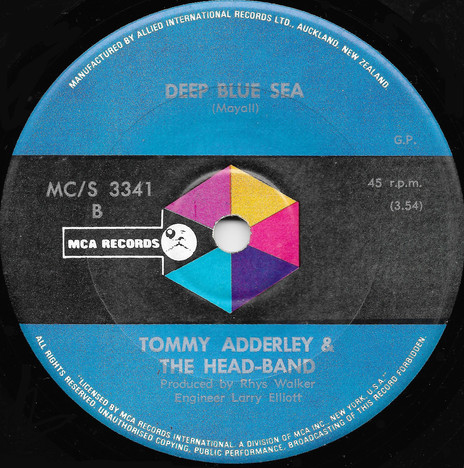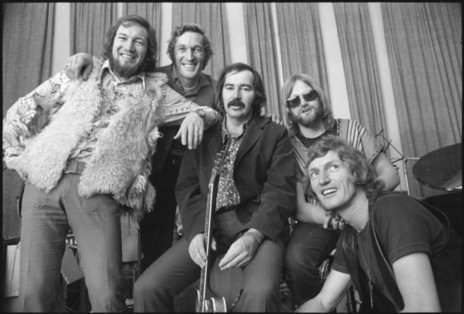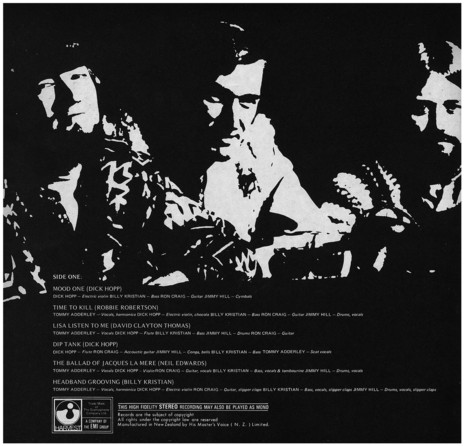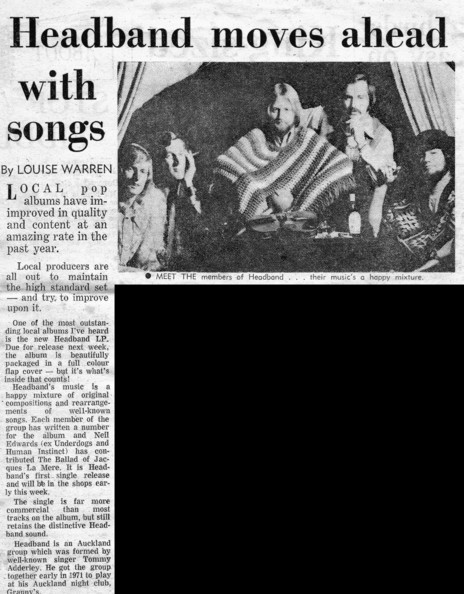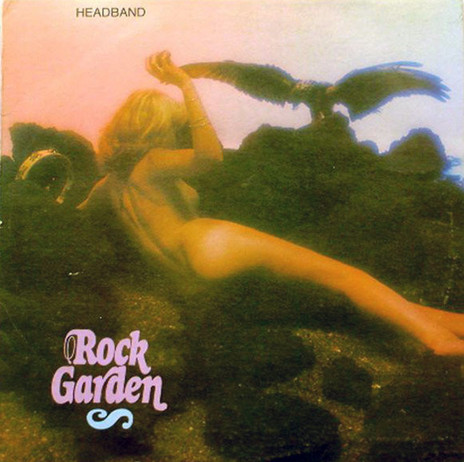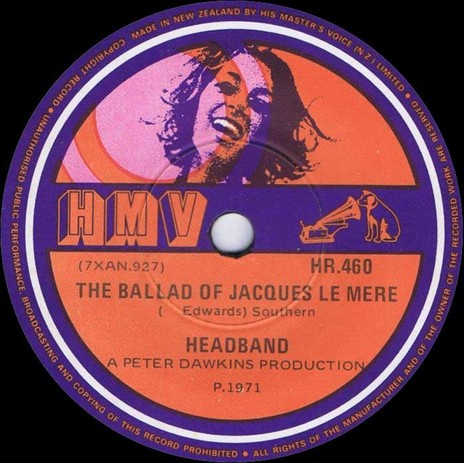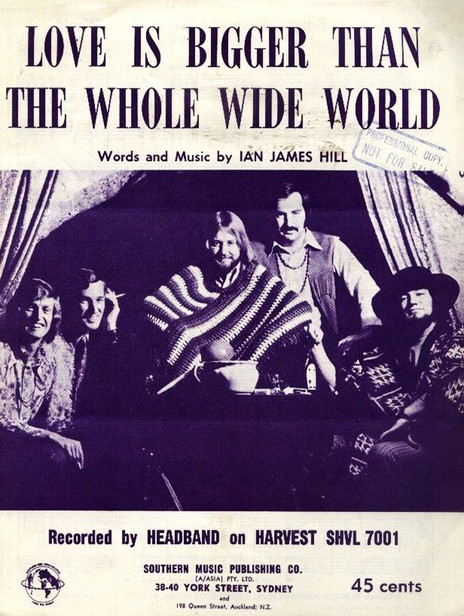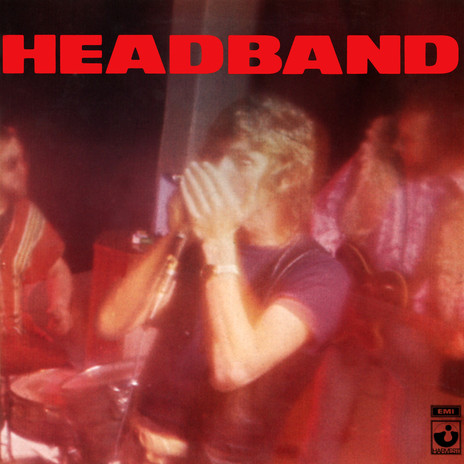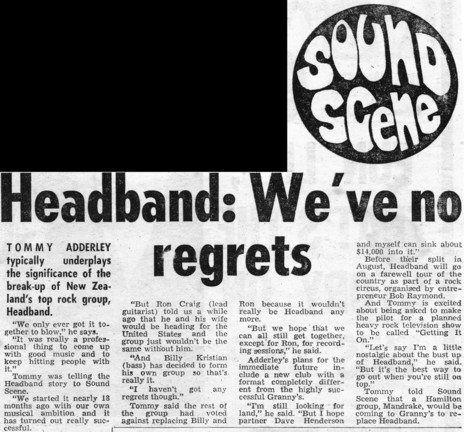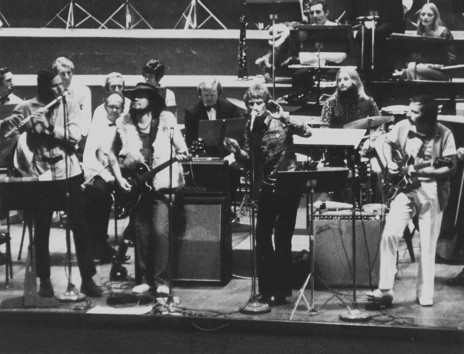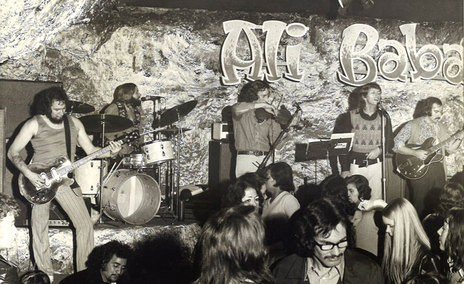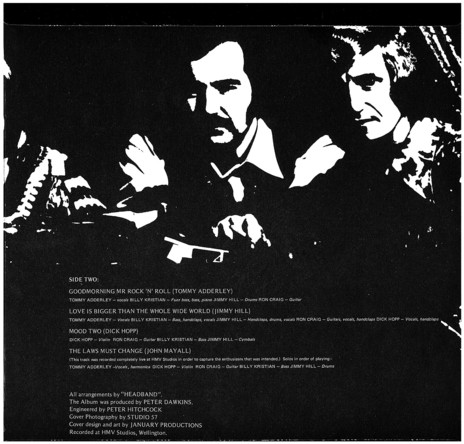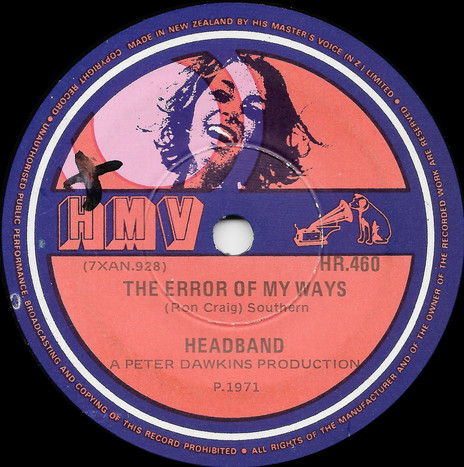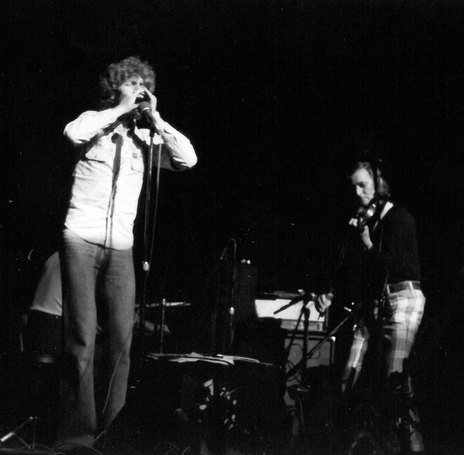Although early publicity shots show Allan Quennell in the band, essentially, lead guitar for the original Headband was handled by Ron Craig (The Keil Isles).
The band was Adderley (harmonica, vocals), Ron Craig (lead guitar), Dick Hopp (flute, electric violin), Jack Stradwick (ex The Action, bass guitar) and Jimmy Hill (drums). Except for Stradwick, they were a bunch of seasoned musicians who were older than others in bands of the day.
In the very early days of their existence they played at Hatchets. But by mid-1971, Adderley was in partnership with Dave Henderson, who leased the Brown’s Lane, Auckland building that had in the past housed the Top 20, then Bo Peep. Headband moved there and with the new partnership the venue was renamed Granny’s.
It was one of those long, narrow places where the stage was in the narrow section beside the dance floor, leaving the band the sense they were out among the dancers. “When you were down on the dance floor,” said Ron Craig, “you were just about dancing with the band because it wasn’t a high stage.”
Granny’s was all about music. “I played there with Headband for two years, packing the place,” said Adderley. It was the starting place for a lot of bands: Mandrake, Dragon, Ragnarok, Karma, Rockinghorse. The support band played early in the evening then Headband came on.
This move re-established the tried and tested combination of Billy Kristian and Jimmy Hill.
Jack Stradwick wasn’t comfortable with all the booze and drugs so left after a short stint and was replaced by Billy Kristian (Keil Isles, Ray Columbus and The Invaders, Max Merritt and The Meteors). Kristian: “I came in from the Far East and straight into a blues band.”
This move re-established the tried and tested combination of Billy Kristian and Jimmy Hill, which had made its mark in bands previously.
Headband was different from other New Zealand bands of those years, says Craig: “There was a definite jazz influence ... and a rock and roll influence and a blues influence. We weren’t a bunch of copyists. There was a lot more improvisation in Headband. I guess there was rock and roll but there were lots of spaces in the music for people to do their own thing. Dick was a very strong influence in Headband. He got in and he played with a lot of fire.”
Adderley: “Dick hated playing rock and roll. We used to fool him. With ‘Good Morning Mr Rock And Roll’ we’d just tell him to play his jazz thing. We’d play under him so he’d happily go along the top.”
Tiny Thompson (ex-Velvet Morning) who worked on the door in the Granny’s days, commented: “One of the things Tommy was best at, and didn’t receive many accolades for, was his harmonica playing. There were times he was as spectacular as Dick Hopp was on flute. When [Tommy] was playing harmonica he had a lot of energy and it was well directed.”
Kristian: “It was a very good blues band with a happy-go-lucky sort of manner. Not your serious blues band. It was ... a have-fun type blues band.”
Very soon after they released its first single, ‘Granny’ (featuring the Auckland National Pop Orchestra) b/w Mayall’s ‘Deep Blue Sea’, Headband began work on its first album, Happen Out.
The band’s best-known song, ‘Good Morning Mr Rock And Roll’, was a single and was included on the album. Adderley’s partner Pam wrote most of the words, but as noted by Craig, “we all put quite a bit into the music. Really, it was Billy’s idea for the riff and chord progression.”
They travelled to Wellington to HMV to do the recording with Peter Dawkins. The album was recorded quickly, live in front of a group of about 30 friends. It needed very little tidying: a few guitar overdubs and a piano overdub by Kristian on ‘Good Morning Mr Rock And Roll’.
Happen Out was released in 1972 and it received many good reviews.
Even doing the album cover was fun. They played a bracket in the photographer’s studio. Kristian: “He just climbed in and around us while we were playing and there were smoke machines going everywhere. He was climbing on step ladders, taking pictures of us. We just played our set, played the half hour in the studio. It was a really great way to take shots.”
Happen Out was released on Harvest in 1972 and it received many good reviews. Mike Stock, writing for the Auckland Star about the track ‘The Laws Must Change’, described the band was “tight and gutty, Adderley’s harp-work mean and lowdown.”
Two of the songs from the album entered the New Zealand music charts. ‘The Ballad of Jacques Le Mere’ got to No.14 in March 1972 and stayed there for two weeks; the Jimmy Hill-penned ‘Love Is Bigger Than The Whole Wide World’ reached No.12 in September, charting for six weeks.
In April 1972 Headband played at the Auckland Town Hall along with the Symphonia of Auckland as the second night of Symphonic Rock. Bob Gillett wrote the arrangements for the show. Jimmy Hill commented that they weren’t allowed to play loud but classical critic LCM Saunders, writing for New Zealand Herald, reported: “There was a fair slice of hard rock pounding out ... and flooding the hall with decibels. The hard rock came from Headband ...”
Because Adderley was a partner in Granny’s, he believed he should stay on-site. But before they disbanded, Headband toured with Ticket, Karma and Corben Simpson. The tour included major centres throughout New Zealand and Headband’s set featured three big hits, ‘Good Morning Mr Rock And Roll’, ‘Ballad Of Jacques Le Mere’, and ‘Love Is Bigger Than The Whole Wide World’.
While Adderley was a partner in both Granny’s and the upstairs club Granpa’s, he formed the second version of Headband.
While Adderley was a partner in both Granny’s and the upstairs club Granpa’s, he formed the second version of Headband. The 1975 line-up was: Tommy Adderley, Jimmy Hill and Dick Hopp from the original band, plus Len Whittle on keyboards (ex-Troubled Minds), plus Neil Edwards on bass (The Underdogs, Le Frame, The Human Instinct). Adderley said they re-formed because people wanted them to record another album. Hill: “It wasn’t like let’s form another band and do it full time. It wasn’t the same attitude as the first band.”
Neil Edwards: “I think Tommy had itchy feet to get another band together. I ran into him one day and said, ‘Know any guys looking for musicians?’ and next minute he got Headband together.”
Edwards had written ‘The Ballad Of Jacques Le Mere’, included on the first Headband album. In 1975, the year Headband re-formed, they released Rock Garden on the Key label. Two of Neil’s songs were featured on the album, ‘Blueberry Pie’ and ‘Only Truly’.
David Gapes wrote the sleeve notes for Rock Garden, noting that members of the band had already been important contributors to contemporary music in New Zealand. “The talent and the years of hard work and experience that are wrapped up in this band could hardly fail to produce a fine record ... The result is really good rock and roll.”
One of most popular tracks was ‘(I Get High) Olena’ written by Adderley and Hill, which was a single earlier in the year. It was a very visual song with a collage of images including the overnight ferry from windy Wellington, a stripper in the sleazy Christchurch club, being on a long national tour, and listening to bands.
Kristian described the first version of Headband as the successful one. They lasted about 18 months, breaking up in mid-1972. The reconstituted band lasted just under a year, but Headband’s music lives on; its songs are often heard on classic hits radio.
David Gapes noted, “Tommy didn’t write much. I think if he’d written more songs he would be remembered more widely than he is. The irony was that he was a terrific writer. He really had the gift for it but he didn’t do it much.”
